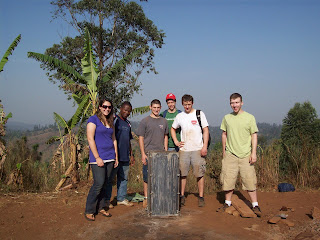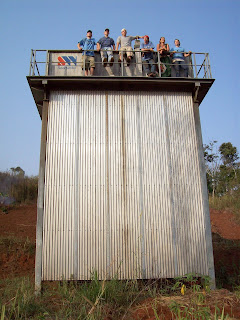Hello friends and family! Life here in Bamenjou and Bakang has been remarkably busy, but exciting, these past couple weeks. Since arriving here from Yaounde we've faced some challenges, but nonetheless spirits are high and we've managed to accomplish a lot of our planned tasks ahead of schedule. We've also been very pleased to witness an even higher level of community involvement than ever before. In this blog I hope to run through some of the setbacks we have faced and the increasing number of accompishments which will hopefully allow us to finish everything we planned before leaving the Cameroon.
The first night we arrived in Bamenjou we had dinner with Nura, our friendly neighborhood Peace Corps volunteer. She has been an invaluable resource; acting as our eyes and ears in Bamenjou and Bakang when we're not in the country. One of the first bits of news she gave us was that the community in Bakang had installed a door on the enclosure around the crossroads water tanks. The door is locked at night and has posted hours of operation. This means that well/tank use is monitored by responsible people, and at night the tank spigots can not be left open or broken. While technically this is a small step, it is very significant with regards to demonstrating greater community responsibility.

Nura also informed us that the community has recently purchased gravel, sand and concrete to contruct more slow sand filters. The next day we drove to Bakang and were very pleased to see some of villagers mixing conrete and filling the steel molds we gave them. Meanwhile, children were streaming to and from the well water tanks to fill buckets.

After witnessing this new level of community involvement, our spirits were further bolstered by a very touching ceremony where Dr. Steve was crowned a prince in Bakang. While having a prince as our faculty advisor is certainly novel, ultimately it was the message conveyed by the chief and the water committee that really encouraged us. We were told of of decreasing levels of water borne illnesses amongst the villagers. We also witnessed monetary pledges from villagers that had emigrated to the big cities around Cameroon. These pledges will help support the water committee and its efforts to maintain the sand filters and wells in the community. All in all the community is taking an increasing level of ownership over this project, and we couldn't be more excited to see this.
However, as I alluded to, there have been setbacks. By far the most frustrating one has been the progress on drilling the two new wells. As I write this entry, the well drilling company is over 5 days late to begin drilling on the first new well. We have been assured that each well takes at most 3 days to drill. Hopefully this will give us enough time to complete both new sites before we must leave the country. Omenously, we were also assured that the well drilling team would be here last Monday. Needless to say we are a little bit nervous.
The flip side of this situation is that since we have not had to supervise the well drilling, we have had time to work on the various other tasks in front of us. As of the 13th, we have built both racking systems and mounted all the solar modules. Most of intra-module electrical wiring is complete. The racks have been set in conrete footings and the concrete slabs/foundations for the water tanks have been poured. The first rack was designed and built at home before we left. This aluminum rack was easy to assemble in country and was set in concrete with the modules mounted in less than half a day. The second rack was a much different story. In effort to use in country materials, we relied on a Cameroonian supplier for the modules and racking system for the second well. While the modules are slightly used and cost about twice as much, they work fine. Unfortunately, the rack itself was more or less a disaster. Not only did the modules not fit into the rack, but it was also made from steel that was "galvanized" with silver paint. It took us two wrecked drill bits, about $200 dollars worth of additional materials and tools, and two days worth of work, but we were able to modify the rack and it is now installed at site two. Yesterday the modules were mounted and the legs were set in concrete. Now both racks sit waiting to be connected to the well pumps.


We have also had time to assemble most of the wiring and many of the fittings for the water pipes. The hope is that this well allow us to just drop in the well pump and screw together a few fittings, bolt the well cap and wire connectors and have a significant portion of the well systems complete in a short period of time.

Today a portion of the team will be at the well sites laying the concrete blocks and placing the water tanks. The goal is to have all wiring and piping connections completed as soon as possible. If the worst case scenario occurs and both wells are not completed before we leave, we aim to leave the systems in such a state that members of the community will have a manageable level of work to do in order for the wells to be completed without our physical help.
Over the next couple days another part of the team will be evaluating elevations, possible piping routes, and spigot locations for the distribution system we hope to implement. Concurrently the assessment team will also be doing site assessments and water quality tests at existing hand-dug wells in the neighboring village of Balatsit. The goal is to evaluate underground water levels and also get an idea of where water is being used in the village. These efforts will help us monitor the water table as our wells are used more and more. This issue will become increasing important when we implement the distribution system.
As we approach the home stretch of the trip, the days ahead appear daunting. However, the team is still positive, and each day we seem to be functioning more efficiently. Moreover, despite various bouts with travel sickness and fatigue the team is now in good health and increasingly eager to work. Last night, Nura, with some help from Alyssa, prepared a wonderful trio of of red, cream, and pesto sauces along with some spaghetti for dinner. It was welcome change from the usual rice, beans, and chewy Cameroonian chicken. The heavy dose of carbohydrates should give us all the energy we need to push forward and make this implementation trip a success.
I'll end this entry with some assorted pictures of the people we're working with.
- Ramsey

Nura: a source of comfort, comic relief, delicious food, and valuable community relations.

Local children playing a game while we are working on installing the solar modules in Balatsit.

Janvier working on the concrete slabs for the water tanks.

The ever helpful Guy: our driver, part/tool finder, soccer player, and cowboy.

Little Guy, affectionately known as "El Diablito."
 Here are some pictures of the new wells, taken recently by Nura. The top picture is the second Bakang well after a bit of cleaning up by
Here are some pictures of the new wells, taken recently by Nura. The top picture is the second Bakang well after a bit of cleaning up by  the community folks. Pix 2 and 3 show the storage tanks near the new well at the crossroads in Balatsit. They've installed a fence around the tanks and they also dug in some steps (more than visible here) to make it easier to get up and down the slope. There's also a fence around the well itself (not shown here).
the community folks. Pix 2 and 3 show the storage tanks near the new well at the crossroads in Balatsit. They've installed a fence around the tanks and they also dug in some steps (more than visible here) to make it easier to get up and down the slope. There's also a fence around the well itself (not shown here).





































